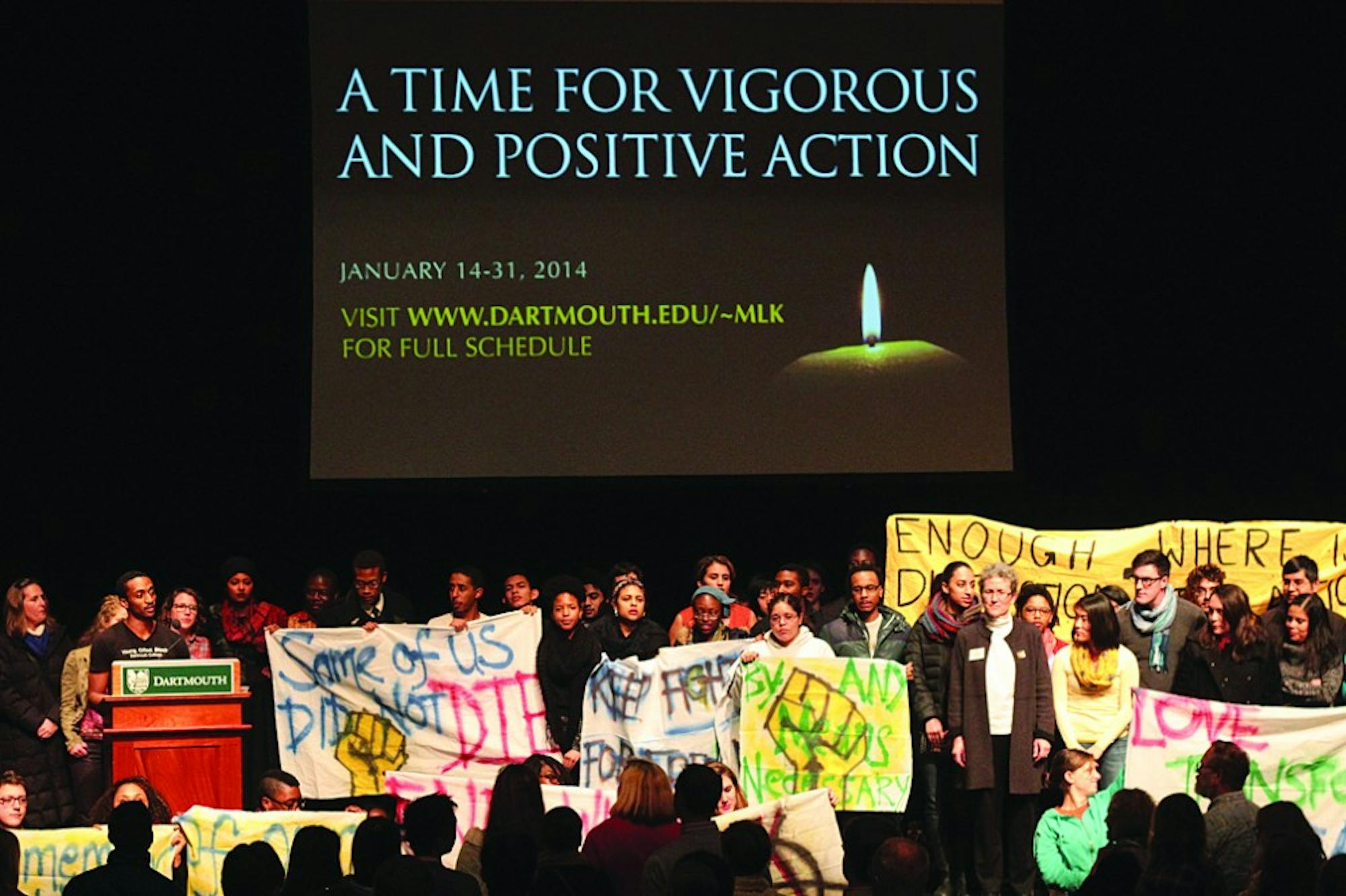For footage of the protest, click here.
Community members took to the Moore Theater stage before ABC News correspondent John Quinones’s Martin Luther King, Jr. Day keynote address on Monday evening, protesting indifference to racial and economic inequality, as well as sexual assault. Roughly a third of the audience participated, unfurling large colorful signs. “Enough distraction — where is the action?” read one. Another protester held up the Anarchist movement’s symbol, an encircled “A.”
Afro-American Society president Jalil Bishop ’14, who introduced College President Phil Hanlon, led the protest. After the president’s remarks, Bishop remained at the podium for over 20 minutes.
“I’m really not here for claps, I’m really not here for celebration,” Bishop began. “I’m here to try to inspire, try to get one person to step up and be more of a change agent than they were when they came in the room today.”
Bishop said Dartmouth has not done enough to embrace King’s mission for racial justice.
“Dartmouth is complicit,” he said. “We are complicit in failing to break down the structure that keeps so many black and brown bodies across the country and around the world marginalized, and keeps so many white bodies benefitting from that marginalization.”
Bishop said that although King and his message of nonviolence have dominated discussions about the Civil Rights movement, memories of protest and the use of force have faded from the dialogue. He advocated for using protest at Dartmouth to affect change, saying that College programming has failed to address issues involving race, sexual assault and the fraternity system, among others.
Toward the end of his remarks, Bishop asked audience members to rise from their seats.
“Stand if sitting is no longer an option, stand if you understand that we must eradicate white supremacy,” he said.
With the audience on its feet, Bishop invited crowd members to join him on stage as he continued to speak. After another five minutes, some audience members returned to their seats, while others congregated at the Top of the Hop to listen to brief speeches expressing dissatisfaction with the current campus climate and calling students to action.
Meanwhile, inside the auditorium, Quinones began to speak.
He described his childhood in San Antonio, where he supported his family of migrant farmers by shining shoes in dive bars at night. From an early age, Quinones said he was interested in journalism because there were so few Latino news anchors on television.
Although his speech did not address the protest, Quinones said in an interview with The Dartmouth that he admired the students’ effort and the College’s willingness to let the protest occur.
“It says a lot about this university that they were allowed to go onstage and get their message out,” he said. “There are other places where they could have been arrested or pulled off the stage or something ridiculous like that. I hope people will hear and listen and that somehow there’s a conversation that’s started.”
His speech credited the government programs that grew out of King’s activism and the Civil Rights era, such as Upward Bound, with helping him graduate from college and journalism school. As a journalist, his Latino heritage helped him cover stories in South America, one of which catapulted him from a job as a regular news correspondent in New York to a host for “Primetime: What Would You Do?”
Following Quinones’ conclusion, protesters handed out sheets titled “Resources for Allyship,” containing a list of left-leaning websites and authors as well as the email address of The Dartmouth Radical, which did not organize the protest.
In an interview after the speech, Hanlon defended his record of receptiveness to student concerns and vowed to engage in discussion with the protesters.
“Since I’ve been here I’ve gone out of my way to listen to students and talk to students, I think that’s pretty well documented,” he said. “They clearly have something they’re very passionate about, and I’m happy to talk to them, too.”
Students who attended the speech expressed approval of the protest mixed with concern that the protesters did not lay out a clear plan of action for affecting the change they wish to see.
“I was proud of the people who went up on stage and the fact that [social activism] exists on campus,” Perri Haser ’17 said. “When I came to school here I actually felt like that might not be the case.”
Freya Jamison ’17 said she was unsure if College policy would change as a result of the protest.
In addition to the keynote address, College programming for Martin Luther King, Jr. Day included an employee breakfast, a play session hosted by Dartmouth Alliance for Children of Color and a quilting marathon. Quilts made by the volunteers were sent to Lutheran World Relief, which will distribute them to refugees around the world.
At 5 p.m., members of Alpha Phi Alpha fraternity, led by history professor Russell Rickford, made the annual Candlelight vigil procession from Cutter-Shabazz Hall to the Hopkins Center.
Throughout the day, an hour-long video of King’s 1962 speech at the College was playing on repeat in Dartmouth Hall.
Staff writer Jessica Avitabile contributed reporting to this article.




